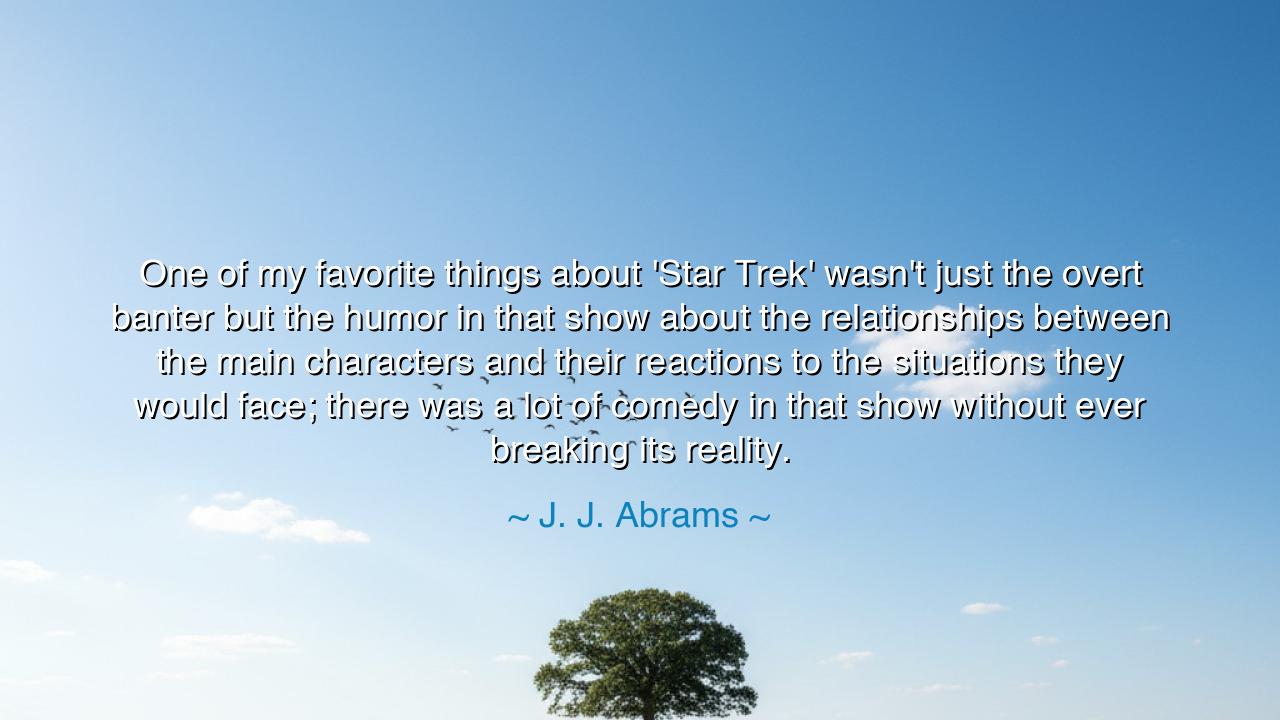
One of my favorite things about 'Star Trek' wasn't just the overt
One of my favorite things about 'Star Trek' wasn't just the overt banter but the humor in that show about the relationships between the main characters and their reactions to the situations they would face; there was a lot of comedy in that show without ever breaking its reality.






“One of my favorite things about ‘Star Trek’ wasn’t just the overt banter but the humor in that show about the relationships between the main characters and their reactions to the situations they would face; there was a lot of comedy in that show without ever breaking its reality.”
Thus spoke J. J. Abrams, a modern craftsman of story and vision, whose words echo the wisdom of the ancients though born in the age of stars and screens. Beneath this reflection on a tale of science and space lies a truth about human connection, balance, and the sacred art of storytelling itself. For in every age, the truest tales — whether carved in stone, written on parchment, or projected across the galaxies — have understood this: that humor and gravity, laughter and truth, are not enemies, but companions on the journey of the soul.
In ‘Star Trek,’ as Abrams observed, there was more than adventure through the cosmos. There was the deep interplay of character and companionship, of conflict and compassion. The crew of the Enterprise did not simply face alien worlds — they faced themselves, and each other. Their humor, born from the friction and affection of friendship, revealed their humanity even amidst the stars. Captain Kirk’s boldness, Spock’s logic, and McCoy’s weary sarcasm — these were not mere traits, but reflections of the eternal triad within all people: courage, reason, and feeling. And when these clashed, it was through laughter, not cruelty, that harmony was restored.
Abrams’ words remind us that even within the gravest story — whether of war, discovery, or survival — there must dwell humor that honors reality. True laughter does not mock truth; it deepens it. It is the gentle release that keeps the human spirit from shattering under the weight of struggle. This is why even in the darkest of epics, the heroes often jest. From Achilles teasing his comrades before battle to Shakespeare’s fools who speak wisdom beneath their mirth, humor has always been the breath between thunderbolts. Abrams saw in Star Trek this ancient pattern renewed — a drama that soared among the stars, yet never lost the warmth of the hearth.
Consider the story of Ernest Shackleton, the explorer who led his men through the frozen desolation of Antarctica. When his ship, Endurance, was trapped and destroyed by the ice, Shackleton faced despair beyond imagining. Yet through it all, he used humor as leadership, cracking jokes at his own expense, finding light in small absurdities, keeping the men’s spirits alive. He understood, as Abrams does, that humor, when rooted in truth, preserves reality — it does not flee from hardship but makes it bearable. The crew of the Enterprise, like Shackleton’s men, faced the void not only with courage but with laughter — and that is why they survived not just in story, but in the hearts of those who watched them.
What Abrams honors is the sacred equilibrium between seriousness and levity, between vision and warmth. To “never break reality” is to respect the truth of a story, even while finding light within it. When laughter comes from love and understanding — from shared struggle — it strengthens the bond between souls. It is false laughter, born of mockery or escapism, that shatters meaning. But the laughter of comradeship, like that which echoed between Kirk and Spock, between man and man, between dream and danger, cements the reality it touches.
Thus, the lesson is not for storytellers alone, but for all who walk through life’s vast frontier. For life itself is much like Star Trek — a voyage into the unknown, full of trials, discoveries, and paradoxes. To live wisely is to carry humor without losing depth, to laugh without forgetting reverence. In family, in friendship, in hardship, one must learn to find joy that does not deny truth, and truth that does not destroy joy. This is the art of balance, the secret that keeps the soul both strong and gentle.
Let these teachings then be remembered:
-
Honor both the serious and the joyful, for life is a union of both.
-
Find humor in struggle, not to escape it, but to endure it.
-
Value relationships, for laughter shared in truth is stronger than solitude in glory.
-
Never break your own reality, for authenticity is the heartbeat of meaning.
So spoke J. J. Abrams, the modern mythmaker who saw that the brilliance of Star Trek was not in its stars, but in its people — and in their ability to laugh, even while staring into the unknown. His words remind us that in every great journey, whether through space or through life, we must carry with us both courage and humor, both gravity and grace. For only when laughter and truth walk hand in hand can we face the vastness before us — and remain, even in the furthest reaches, profoundly human.






AAdministratorAdministrator
Welcome, honored guests. Please leave a comment, we will respond soon